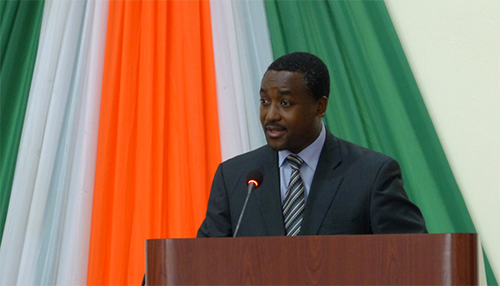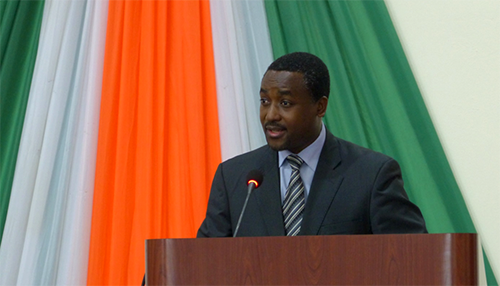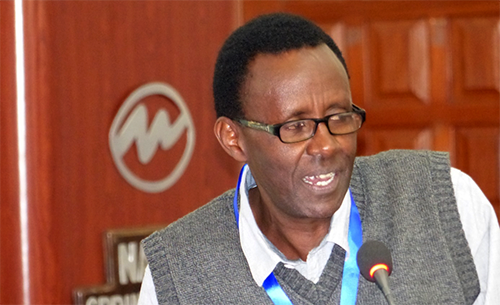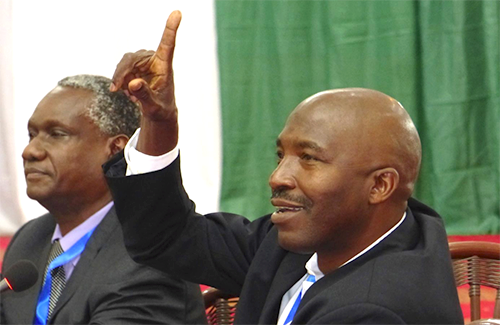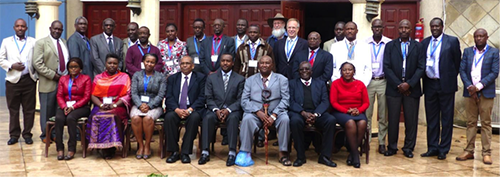
Mr. Jean-Baptiste Havugimana, representing the Deputy Secretary-General of the East African Community (EAC).
From August 8 to 12th, the little town of Arusha, at the foot of the mighty Kilimanjaro mountain, also home to the Headquarters of the East African Community (EAC), became the meeting point for government veterinary and legal officers. In the framework of the series of training seminars on Regional Harmonisation of Legislation in the Veterinary Domain, organised under the auspices of the Strengthening Veterinary Governance in Africa (VETGOV) programme, funded by the European Union, these officers took a closer look at problems surrounding the legal requirements for veterinary products and veterinary vaccines.
The 5-day long intensive training course was attended by all 5 of the EAC Partner States, i.e. Burundi, Kenya, Rwanda, Tanzania and Uganda, with a delegation of at least one legal expert and one or two veterinary experts.
Overall, the seminar was attended by some 28 participants, observer staff of the OIE, the Food and Agriculture Organisation of the United Nations (FAO), the African Technology Policy Studies Network (ATPSNet), the Global Alliance for Livestock Veterinary Medicines (GALVMed), the East African Community (EAC) Executive Secretariat, the African Union’s Interafrican Bureau for Animal Resources (AU-IBAR) and OIE facilitators, including the two OIE Veterinary Legislation Support Programme (VLSP) experts, David Sherman, OIE Coordinator of the VLSP, and Jim Fingleton, OIE VLSP legal expert.
The meeting was officially opened by the Director of Veterinary Services of Tanzania, Dr Abdu Hayghaimo, on behalf of the Minister of Livestock and Fisheries Development. Prior to this, opening statements were made by Mr. Jean-Baptiste Havugimana, representing the Deputy Secretary-General of the East African Community (EAC), Dr Tabitha Kimani on behalf of the Food and Agriculture Organisation of the United Nations (FAO), Dr Walter Masiga on behalf of OIE, Dr Lois Muraguri on behalf of the Global Alliance for Livestock Veterinary Medicines (GALVMed) and Dr Mohamed Abdel-Razig Aziz on behalf of the African Union’s Interafrican Bureau for Animal Resources (AU-IBAR).
Group photograph
During the opening day of the 5-day seminar, presentations were made by the various stakeholder organisations :
Through a series of working groups over the next days, the participants first made a critical evaluation of their respective country legislation regarding the regulation of veterinary vaccines and medicines to identify gaps and weakness in their legislation. Then they revisited their legislation in the context of providing a sound legal basis for the EAC/GALVmed initiative on mutual recognition procedures (MRP) for the registration of veterinary vaccines. This was followed by group discussions to identify additional challenges to successful implementation of vaccination programmes and associated gaps in legislation. Finally the participants identified gaps that could be effectively resolved in the context of a regionally harmonized approach through the EAC.
The meeting recognised that in order to overcome vaccine quality and delivery challenges on a regional basis, the following issues were crucial and require addressing:
Dr. Isidore Gafarasi Mapendo, Director of Veterinary and Laboratory Services, Rwanda Agriculture Board
This was the 6th in a series of training seminars on Regional Harmonisation of Legislation in the Veterinary Domain, jointly organised by AU-IBAR, OIE and FAO in partnership with the Regional Economic Communities since 2014. The next and last seminar of this kind is scheduled to take place in mid – 2017 for the Member States of the Common Market for Eastern and Southern Africa (COMESA), subject to COMESA Secretariat approval.
Dr. Sero Luwongo, Principal Veterinary Officer, Ministry of Livestock and Fisheries Development, Tanzania. Behind him, Dr. Bedan Masuruli, Registrar of the Tanzania Veterinary Council.
Group photograph. All pictures (c) P. Bastiaensen (oie) 2016.
